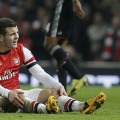Pirlo, Busquets and The Rise Of The Modern Libero
Positions in football tend to fade away and then come back, at times with a twist, and the libero is no different. Here's how Barcelona's Busquets and Pirlo of Juventus are bringing it back...
Since the rise of the ‘flat back four’, the sweeper and more specifically, the libero role had all but disappeared from the footballing world for a number of reasons. In part, this was because the position itself was such a specialist one, which demands various abilities from those playing it: on a basic level, they needed both attacking and defensive prowess, while therein they require excellent reading of the game, strong passing both short and long range and vision that will allow the player to anticipate the movement of oncoming attackers as well as acting as their platform to trigger attacks and counterattacks alike for their own team. The origin of the sweeper came with the catenaccio philosophy and in that they were very much a fifth defender, who would then send the ball out wide for his side to claim their slim, but well-planned victory. The libero grew from this, sharing the same duties in defence but with far more importance placed on their attacking duties. The best in the position would be roaming across the pitch, being seen as a team’s hub, performing as a combination of primary playmaker and defensive organiser, with his positioning being vital to the rest of the team.
So why did the position become so outmoded? Well, as is evident, the ability needed to perform there is great and even with that rare combination of talents, it requires a system built to accomodate them, hence the need for other defenders who can work alongside a sweeper and a set of forward players who can work with their main creator operating from so deep. Beyond that, worldwide football has undergone a substantial ideological change. The desire from most corners now is to produce attacking football and even nations who suffer from the ignominy of the stereotype of being a ones with defence-based mentalities have adapted to and with their fellows. From there, players are trained initially with going forward as their foremost ideal, so if they wish to become defenders they must almost retrain, so most significantly, many are not defenders trained in defending from an early age. Their retraining means they must develop a new way of thinking about football and they are not true defenders, coached in the so-called ‘art of defending’. Hence, to put it bluntly, defenders are not as good at defending as they were back in the heyday of the sweeper. Meanwhile, the shift in overall focus means that forward-going players are collectively (arguably) better than ever they have been, and even ‘defensive’ ones are more proficient in attack. The growth in the popularity of the ‘offside trap’ tactic also somewhat nullifies the sweeper, as it undermines the tactic completely, having one player operating behind the well-organised line. Most players are more complete in the modern game with regard to attacking but, as previously stated, weaker defensively.
The player who most exemplifies the characteristics is the controversial Sergio Busquets. On the pitch he personifies a lacking in morality with his constant diving and petulance, but these aspects of him unfortunately overshadow what a phenomenal footballer he is.
This gave way to the rise of the defensive midfielder. Rather than have the last line of outfield defence being someone behind a main line which would struggle against an onslaught, the idea was to move that player forward and remove the pressure from the defenders, creating a further wall and line of defence. The standard job of the defensive midfielder is to break up play, recover possession and protect the defence. Here it is evident that there is not only no need for a sweeper, but that one would be detrimental, not giving the back four (or back three) the forward protection they require. Then the defensive midfield position evolved, incorporating both ‘destroyers’ and ‘registas’ or deep-lying playmakers. A strong, modern regista requires many of the attributes previously described for a good libero: some defensive awareness, good reading of the game, a large range of passing and the ability to dictate play. Though they generally lack the great defensive ability of a destroyer-type of defensive midfielder, who cover the rest of the list of required qualities (the more defensive side of them) of a libero. The role has gone forth and multiplied: it takes two players to do what one libero would, but they play in a more protective capacity to their predecessors. This is not an evolution of the libero role, though – if anything it is a devolution, there to make up for the fact that there are so few players left with the skill to play in the position, while reflecting that the level of modern defending has been and is receding.
This does not mean that the position is dead. On the contrary, a revival may well be due. The first mainstream resurrection of the sweeper came in World and European Champions Spain’s EURO 2012 group stage meeting with Italy. Azzuri boss Cesare Prandelli elected to choose Daniele De Rossi in a back three, alongside Giorgio Chiellini and Leonardo Bonucci, as a counter-tactic to Vicente del Bosque’s selection of Cesc Fabregas as a ‘false nine’. Overall, the tactic worked well; although Spain dominated possession, they made very few clear chances, capitalising on Italy’s sole defensive lapse. De Rossi, ordinarily a defensive midfielder shared creative duties with Andrea Pirlo, who epitomises the aforementioned regista role deep in midfield. In terms of attempting to start attacks, De Rossi attempted more long passes than any other play on the field (13), completing 8 overall, with 36 of his 53 attempted passes going forward. Where Pirlo dealt with the ball retention and creation in midfield and through the centre of the pitch, De Rossi (as shown here) aimed to start attacks down the wings. Defensively, he had a 100% tackle success rate (3/3) and made 5 interceptions, and he was instrumental in containing Spain as no team has in some time, even those who have beaten them. This game showed that the sweeper is far from dead or obsolete, but it reinforced just how much of a specialist role it is. De Rossi is a player with outstanding talent, but there are few comparable. He disrupted Fabregas greatly, near-man marking him; and while the former Arsenal man moved deeper in an attempt to bring him from his position and create further space behind him, the two Juventus centre halves alongside the Roma man were not so easily drawn in by Fabregas’ movement.
This is, in part, why teams find it so difficult to deal with Lionel Messi. Far beyond his superhuman footballing ability, his movement against flat back fours drags defenders from one side of the pitch to another, creating space for himself or his near-equally as talented teammates to utilise. Fabregas attempted to act in a similar way but the tracking of his movement by De Rossi made it extremely difficult for him.
The flurry of false nines mean that an effective tactic must be deployed against them, but not any team will be able to just implement a sweeper.
De Rossi is not the only player around with the potential to play as a libero. The player who most exemplifies the characteristics is the controversial Sergio Busquets. On the pitch he personifies a lacking in morality with his constant diving and petulance, but these aspects of him unfortunately overshadow what a phenomenal footballer he is. He is one of the most complete and extraordinary players in the game. For most sides he would have far more of a creative presence, but at Barcelona, surrounded by Xavi Hernandez, Andres Iniesta, Fabregas, Messi, Alexis Sanchez, et al, he is not needed to perform these duties. With Barcelona’s expert ball retention, their defence will often be perched on the opposing side’s halfway line, with Busquets sitting just in front, pulling the proverbial strings. His 86% long pass accuracy, coupled with his fantastic 91.5% short pass accuracy (with an average of 72 passes competed per game) shows his metronomic quality, but his goal and assist stats are relatively very low given that this service is not required of him (stats provided are almost exclusively from games in which he has played in defensive midfield). His defensive work often goes unnoticed, but his solid performances at centre half in both back fours and back threes over the past three years have demonstrated that he has the defensive and spacial awareness, as well as the passing ability and tremendous vision required to be a supreme libero, as well as playing in a team which could use this potential as a backup plan, to attempt to create from further back on the pitch, if all is not going their way. Javi Martinez of Athletic Bilbao is a similar case, though perhaps even more so, as he is so well-trained defensively, having spent the majority of this season playing in defence, despite naturally being a midfielder.
Where modern football appeared to have moved away from the libero, perhaps a return is on its way. The flurry of false nines mean that an effective tactic must be deployed against them, but not any team will be able to just implement a sweeper. As has been alluded to, the position needs such brilliant intelligence and ability that only a select few will be able to do it. These few could lead a tactical revolution. The forward threat a good libero can carry can be incredibly difficult to counteract for defending sides, while a well-performed sweeping job in the centre of a specifically trained defence can form a near-impenetrable defensive barrier. The possibilities could be endless, but before that they will need to re-begin.
Other stories that might interest you…
The Greatest Goal I Ever Saw: Juventus Legend Alessandro del Piero vs Germany
10 Reasons That Juventus Are Back On Top In The Serie A
Is Juventus’ Milo Krasic The Winger To Reignite Liverpool?
Tito Vilanova: Who Is The New Boss Of Barcelona?
Barcelona: Pep Guardiola – A Great Manager Or Good Manager Of A Great Team?
Why Barcelona Are A Fading Force
Click here for more articles about Football and Sport in Sabotage Times
Click here to follow Sabotage Times on Twitter
Click here to follow Sabotage Times on Facebook
If you like it, Pass it on
 COMMENTS
COMMENTS
fantastic article!
fantastic article, more please!


 RELATED
RELATED







 SABOTAGE
SABOTAGE





